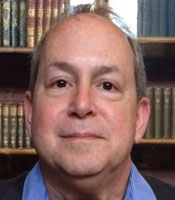Hageman Distinguished Lecturer in Agricultural Biochemistry

Dr. Elliot MeyerowitzGeorge W. Beadle Professor of Biology November 19-20, 2014Lecture: "Physical as well as Chemical Signals Control Plant Development" Colloquium: “Computational Morphodynamics: an Approach to the Study of Plant Growth and Development." |
About the speaker
Elliot M. Meyerowitz is George Beadle Professor of Biology at California Institute of Technology. He served as Chair from 2000-2010, then was the Inaugural Director of the Sainsbury Laboratory at Cambridge while on leave from CalTech.
Professor Meyerowitz says he’s been interested in science for as long as he can remember. A constant theme in his research is trying to understand patterns and connections. To succeed in that quest, he has developed important tools, and chosen suitable model systems. He obtained his A. B. in biology from Columbia University and both M.Phil. and PhD from Yale university. His PhD dissertation focused on the ways in which the optic lobe and the eye of drosophila make essential neuronal connections. The developing eyes determine the axonal array of the optic lobe, indicating that signals must be transferred from eye to brain to form the correct adult pattern.
Recognizing the limitations of traditional genetic approaches, Dr. Meyerowitz went to work with David Hogness at Stanford University, again focused on drosophila as a model organism. While there, he developed a chimeric cloning vector (cosmid) which was built of phage lambda and the plasmid pBR322. This allowed isolation of large DNA fragments, ~ 40 kbp, an essential tool for sequencing pieces of DNA larger than a single gene transcript. Once he established his own laboratory at CalTech, drosophila was further explored.
At about the same time, advances in plant biotechnology in the laboratory of Eugene Nester, our first Hageman lecturer, made it possible to do for plants what was being done for animals using drosophila. A key piece in this effort to understand the patterns and connections of developmental programs, was in choosing arabidopsis as a model system. Dr. Meyerowitz crucially confirmed the small size and minimal repetitiveness of the arabidopsis genome. Along with Chris Somerville he became a strong and effective advocate for the use of Arabidopsis thaliana. That led to an explosion in basic research into how plants grow.
The description of how flowers form, using the “simple” ABC model was a major advance made in the Meyerowitz lab. The genes in this set of regulatory molecules underlie the vast floral industry. Think of roses, carnations, chrysanthemums, all of which are dramatically altered in floral structure from their wild progenitors. More important even than these economic implications for flowers, the general principles identified in flower development apply to all stages of plant development.
Dr. Meyerowitz is recipient of many honors and recognitions including membership in the American Academy of Arts and Sciences (1991), the U.S. National Academy of Sciences (1995), and the American Philosophical Society (1998). He is a foreign member of the French Académie des Sciences (2002) and the Royal Society of London (2004).
Awards include the Genetics Society of America Medal (1996), the International Prize for Biology from the Japan Society for the Promotion of Science (1997), the Richard Lounsbery Award from the U.S. National Academy of Sciences (1999), the Wilbur Cross Medal of Yale University (2001), the Harrison Prize of the International Society of Developmental Biologists (2005), and the Balzan Prize for "Plant Molecular Genetics" (2006), shared with Christopher Somerville.
Dr. Meyerowitz has served on many journal editorial boards, directed the research of a large number of graduate students and postdoctoral fellows and written many high impact papers.
Professor Meyerowitz over the past decade has directed his attention to broad issues in plant development, using computational and modeling techniques to understand ways that complex organisms grow and develop. Specifically, his group is intensively studying how plants respond to physical forces, whether internal, such as turgor pressure, or external. Hence the title of this year’s Hageman lecture.